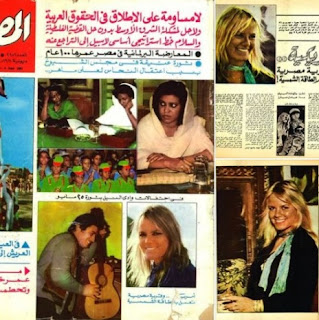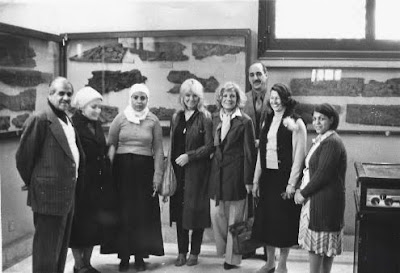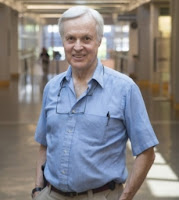 |
| Al Musawar magazine, 1981, on the Solar Video project |
I have been thinking about the date 2/22/22. This multiple of 2s falls on a Tuesday.
That's a lot of 2s. And a Tuesday thrown in for anyone who didn't notice the first roll of the dice. What, if anything, does this mean?
I am not in any way a fanatic about numbers, planets, fate, ancient origins of words, or any of that stuff. I look at these topics as interesting, a side dish to my life rather than the entree.
 |
| Me, center, with film star Nadia Lutfi on my left in the Cairo museum |
But I couldn't pass up an opportunity to look at this singular date on the calendar and wonder, what if it does mean something?
Numerology says this about the number 2: "The Numerology number 2 is known to numerologists as a supremely feminine force, one that represents both grace and power. It is cooperative, always aiming to bring peace and balance back to a relationship or situation. This Numerology number is also very sensitive -- of all the numbers, it has the strongest intuition. It is able to sense currents and feelings instinctively, then use these clues to connect with others emphatically.
At its very core the 2 in Numerology represents partnerships -- the coming together or balancing of two individual people, concepts, or things. While it holds great power over any situation, it wields it with such diplomacy and tact that the result is not control and authority, but harmony and teamwork. It is a mediator, able to see two sides of a situation in an unbiased way and guide others down the middle road."
My mom, Julia Elizabeth Strauss Combier Taschereau (see her wedding announcement, New York Times, June 2, 1948, above) collected books on everything - Mysticism, Rosicrucianism, Buddhism, Christianity, the metaphysical value of life and being, etc - as any intellectual would who was raised by parents who were German Jews with a lot of money and time to contemplate about things. Her father, my grandfather Samuel Strauss was a journalist and newspaperman. Her birthday was February 14, or 2/14, and I and my twin were born on 7/11. My mom volunteered for 49 years at a church in Manhattan, and every Sunday after services she took a cup of water to Central Park, only a block away, where four-leaf clovers jumped up and she put them into her cup so they wouldn't shrivel up before she was able to press them in plastic sheets when she got home. I found some too. Four leaves meant something, three leaves not so much. I think that the information that my paternal grandmother was from Ireland is irrelevant (or is it?).
So numbers have always been interesting, just as "coincidences" are. When I was at Northwestern University, I majored in Child Psychology but minored in synchronicity (actually, English literature) because so many events seemed to be happening which altered my life in meaningful ways, yet could not be rationally linked. I always make note of cues that say "stop" what you are doing, look at this. I'm suggesting that you do too.
A belief in synchronicity must be accompanied by a certain amount of faith in knowing that you are presented with information for which there may be no factual reason and that you are being challenged to find one, or not. We human beings are always trying to find the basis for something happening in order to unravel the chaos around us and make some kind of sense of it all. Sometimes it is useful to do this, other times, not. Maybe more time should be spent on saying to yourself, "ok, this happened. Now, what do I do about it, if anything?" We each can and should give an event its' meaning but not look for "the" reason given to you by someone else. It gets complicated. Just do not accept anyone else's definition of the reason for something happening. Sure, it is fun to look at why or how, but I believe in going to "what do I do now"? "What meaning does this have for me"?
Everything we do is based upon a certain amount of faith. When we cross a busy street at a green light, we must have faith that we will not be run over by a car. When we reach the stairs and prepare to walk down them, we must have faith that we can walk without tumbling and hurting ourselves. You stop thinking about faith, but it is always there, as are the bad things that happen to good people but not for the lack of faith. I believe we just need to try to see the road less traveled on which we are being asked/compelled/directed to embark. As you can see in the NY Times' article above, the best man at my mom's wedding was NY Supreme Court Judge David W. Peck. His son, M. Scott Peck, wrote the book "The Road Less Traveled", a book that suggests that "living a life of spiritual growth requires a loving nature and being open to new perspectives, including the helpful and mysterious force of grace. Taking the road less traveled isn't easy – it takes effort, will, and a strong sense of self-discipline."
I believe that, except I would argue that taking that road is easy. Staying on it, much harder. This book has been my guide throughout my life.
The quote below is on my Facebook page and at the top of a page on my website Parentadvocates.org:
"FAITH When we walk to the edge of all the light we have and take the step into the darkness of the unknown, we must believe that one of two things will happen. There will be something solid for us to stand on or we will be taught to fly." Patrick Overton
 |
| Christopher Wren |
For instance, after I read about Basaisa, a solar village in Egypt's Nile Delta area in the NY Times on June 11, 1978, by Christopher Wren, I tore the entire page out and put it in my desk, hoping sometime to get to this little village in Egypt to see the solar TV, a wonderful invention, and to meet Dr. Salah Arafa at the American University in Cairo. I was lucky to meet Mr. Wren and thank him in the mid-1980s.
At the time I was a producer of TV video programs with ABC. Every year members of the National Academy of Television Arts and Sciences ("NATAS") were invited on a trip to a part of the world where a visit would be made to the television station headquarters. In November 1978 where was the trip scheduled to go?
Egypt. I "knew" I had to be on that trip.
A few minutes after taking my seat on the charter flight, I heard "Betsy, what are you doing on this plane?" I looked behind me, and there was Jimmy, my cameraman from the days when I produced the show "Cue on J", and a friend. I could not believe the coincidence, and he told me that if he had a free day during the week in Egypt, he would be glad to accompany me to the little village with his cameras, and we could do a little mini-documentary.
We got off of the plane, went to our hotel, the Mena House, across the street from the Pyramids. Quite a wonderful place.
While everyone in my group went to the Cairo Museum, I got into a taxi and paid 25 cents to go to the American University to find Dr. Arafa. When I found his office, I took a seat and waited for him. He finally entered the room and changed my life. He spoke about setting up the solar-powered TV so that he could tell the villagers in Basaisa all about helping themselves by working together.
Of course, his free day was Thursday, which was the exact and only free day I and Jimmy had, and we all went to Basaisa. I saw the kids watching an Egyptian program on the TV and asked Dr. Afara if he thought the solar panel on the roof of the little room could be used to power a video playback machine. I could borrow cameras from the networks. The purpose was to assist the people in producing their own programs using solar video equipment. Salah liked the idea and did not think I was crazy. He did a voice-over for my short piece on the solar TV which NBC news grabbed up when I returned to New York City. Salah remains a mentor for me.
What are the odds of going on a trip to Egypt a few weeks after reading the story of the solar village in the NY Times, having a friend on my plane with his camera equipment want to help me with a story out in the middle of nowhere in Egypt's Delta area, meeting Salah, getting the idea for a solar video project, and having such a widely-respected physics teacher at AUC believe in this far-out idea of the solar video? I don't know, zero to 100% I guess.
I returned to NY and told my mom that I was moving to Cairo, and I did just that. I set up a system where villagers produced videos, and we passed these on to various members of the Egyptian government who were ready and willing to allocate funding to appropriate technologies desired by the villagers themselves, with the details stated in their own voices. I became friends with everyone in the Egyptian government after a film star, Nadia Lutfi, told me I was moving into her duplex in Garden City, Cairo because my friend Abdel Rahman Ali asked her to take care of me while he received cancer treatment in London. I would only leave my small flat near AUC if she agreed to take my two puppies rescued by me after I found them sitting under a car outside my apartment. Paula (Nadia's real name) agreed, so I moved to Garden City with the two little pups.
I was at the time enrolled in a Master's Program at NY University, the Interactive Telecommunications Masters Program, or ITP, and fortunately, Director Red Burns was interested enough to allow me to write reports on my Egyptian solar video project to complete my coursework. I wrote my Master's thesis on the application of solar video to agricultural projects in rural Egypt and received my MPS in 1984, when I left Egypt and put the self-sustaining solar video project in the capable hands of people at the American University in Cairo. The ABC Network office in London transcribed the Egyptian PAL System tapes to NTSC for free so I could play them in the US. I still have copies of these tapes.
People say if you are open to the idea of synchronicity, a holographic universe, instances of deja vu, and similar instances of mystical occurrences, you will notice things that happen to you and choose to examine the event, person or thing a little more carefully. You may see a new path that you had never considered, or you may want to make changes to your career or life and believe that you should/could/will succeed.
Tuesday, February 22, 2022. Think about it.
Betsy Combier
Editor, Parentadvocates.org
Editor, New York Court Corruption
Editor, National Public Voice
Editor, NYC Public Voice
Editor, Inside 3020-a Teacher Trials


No comments:
Post a Comment